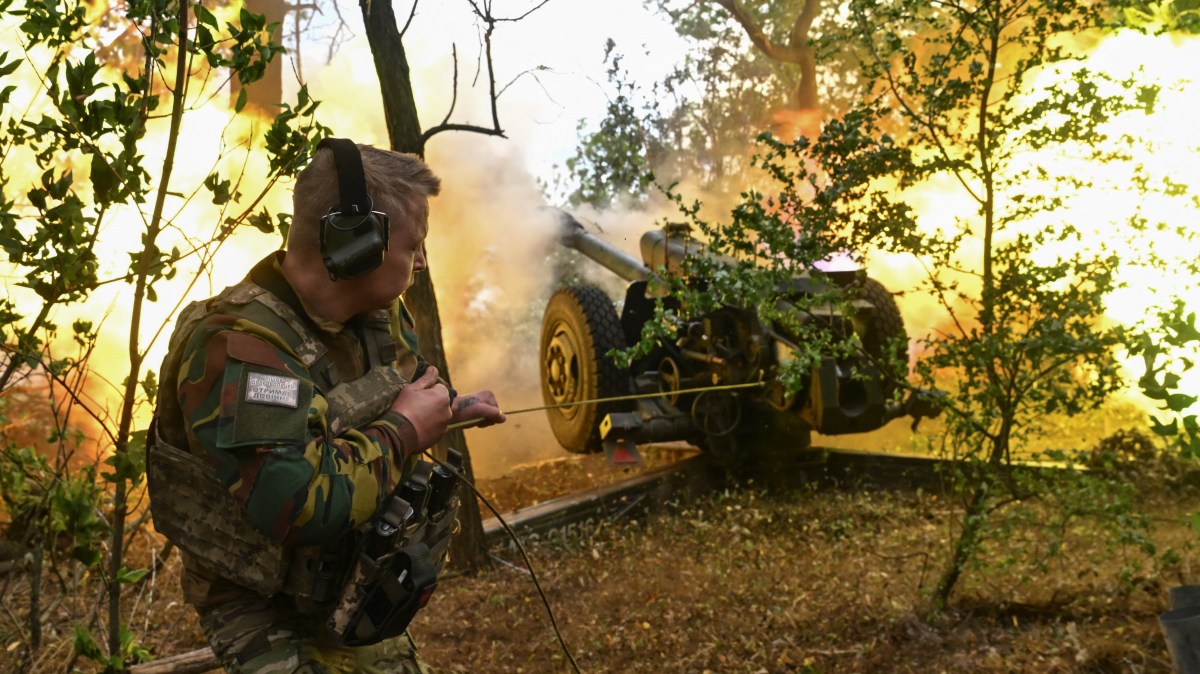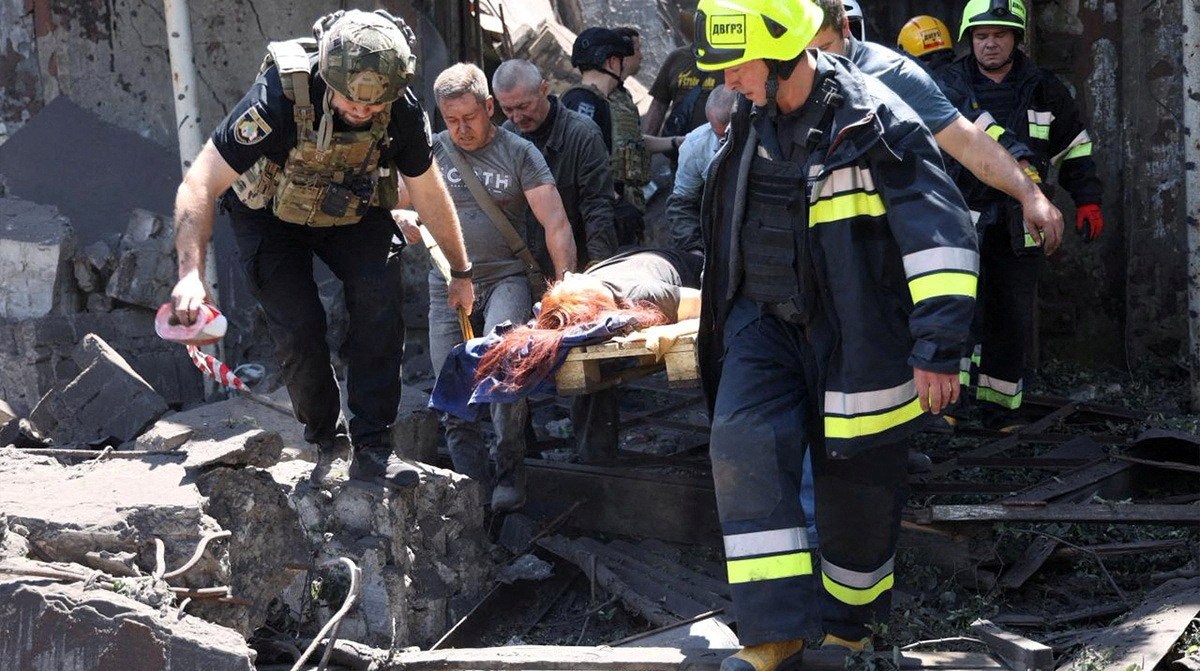Russian forces have for the first time taken full control of one of the four Ukrainian regions that President Putin claimed to have annexed almost three years ago, a pro-Kremlin official has said.
Leonid Pasechnik, the Kremlin-appointed head of the occupied Luhansk region in eastern Ukraine, told Russian state television that the territory was now “100 per cent” under Moscow’s control.
Ukraine has yet to comment. However, Deep State, a Ukrainian website that monitors frontline movements, has long indicated that Russian forces occupied almost the entirety of the coalmining region. Putin said in March that Moscow had “liberated” 99 per cent of the area.
The city of Luhansk, the regional capital, has been under Russian control since 2014 when Putin covertly deployed troops to aid a small pro-Moscow separatist movement in Donbas, which includes the neighbouring Donetsk region.
Russia officially recognised the independence of both regions days before Moscow launched its full-scale invasion of Ukraine in February 2022. Seven months later, in September 2022, Putin announced at a glittering ceremony in the Kremlin that they were officially part of Russia. He also said Russia was annexing the Kherson and Zaporizhzhia regions in southern Ukraine.
The Kremlin has said that there can be no peace in Ukraine unless Kyiv surrenders the four regions in their entirety to Russia. President Zelensky has rejected the demand. Moscow controls more than 70 per cent of the other three regions, as well as all of Crimea, the Black Sea peninsula that it annexed in 2014.
Leonid Pasechnik was appointed leader of the Luhansk region by President Putin
GAVRIIL GRIGOROV/SPUTNIK
Pasechnik, who was born in the city of Donetsk, was made a member of Putin’s United Russia party in 2021. He is one of thousands of Ukrainians who have collaborated with the Kremlin since 2014.
• Grief-stricken Kim Jong-un mourns soldiers killed fighting for Russia
This comes as Ukrainian drones attacked the Russian city of Izhevsk on Tuesday, killing three people and wounding dozens in one of the deepest strikes inside Russia of the three-year conflict, authorities said.
Izhevsk, which is more than 620 miles from the front line, has arms production facilities including factories that make attack drones and Kalashnikov rifles.
A Ukraine security services source said Kyiv had targeted an Izhevsk-based drone manufacturer and that the attack had disrupted Moscow’s “offensive potential”.
Meanwhile, Russian state media also said that Putin’s forces had for the first time taken control of a village in the Dnipropetrovsk region, which borders the Donetsk region.
Vladimir Rogov, a pro-Moscow official in occupied Ukraine, said Russia had seized the border village of Dachnoye. “This is the first populated area in the Dnipropetrovsk region from which the enemy has been expelled,” he wrote on Telegram.
The claim has not been confirmed and Ukrainian military officials have previously said that their troops have pushed Russian forces back from the border area. However, even if verified, Ukrainian officials say Russia’s incursion into the Dnipropetrovsk region, a vast area that includes Kryvyi Rih, Zelensky’s home city, would be of symbolic significance for Moscow. The Ukrainian authorities began the first compulsory evacuation of children from frontline villages in May.
Dnipro, the regional capital, is targeted regularly by Russian drones and missiles. At least 17 people were killed last week in the city when Russian ballistic missiles damaged schools, hospitals and a passenger train. About 280 people were injured, including dozens of children. Zelensky accused Russian forces of a “complete disregard for life”.
A firefighter battles a blaze after a Russian drone strike in Zaporizhzhia on June 18
REUTERS
Despite casualties that are estimated at one million dead or injured and mounting economic problems, there are no indications that Putin is considering an end to the invasion. The war, the biggest in Europe since 1945, will reach its three-and-a-half-year mark in August.
On Tuesday it emerged that the US Pentagon has halted some shipments of air defence missiles and other precision munitions to Ukraine over concerns that stockpiles are too low.
The decrease in weapons shipments promised to Kyiv under Joe Biden’s administration has occurred in recent days.
Among the weapons that are being delayed are air defence interceptors that would help knock down inbound Russian drones and missiles.
A White House spokeswoman said: “This decision was made to put America’s interests first following a [Department of Defence] review of our nation’s military support and assistance to other countries across the globe. The strength of the United States Armed Forces remains unquestioned — just ask Iran.”
Although Russia and Ukraine held face-to-face talks in Istanbul on May 16 and June 2 that led to a series of prisoner exchanges and the return of dead soldiers, there has been no progress on a ceasefire and no date has been set for a new round of talks.
Keith Kellogg, President Trump’s envoy for Ukraine, said on Monday that “Russia cannot continue to stall for time while it bombs civilian targets in Ukraine”. The Kremlin rejected the allegation.
“No one is delaying anything here,” Dmitry Peskov, the Kremlin spokesman, said on Tuesday. “We are naturally in favour of achieving the goals that we are trying to achieve through the special military operation via political and diplomatic means. Therefore, we are not interested in drawing out anything.”
Rescuers carry an injured woman to safety after a Russian missile strike in the Dnipropetrovsk region on June 24
REUTERS
Russia’s invasion has been accompanied at home by an unprecedented crackdown on dissent. Last week, a photographer in the Ural city of Perm was sentenced to 16 years in prison on treason charges after he shared a freely available book on Soviet-era underground bunkers with an American journalist.
Grigory Skvortsov, who has spoken out against the war in Ukraine, was arrested in 2023 by Federal Security Service officers. He said they beat him and tried to force him into confessing that he betrayed Russia. The American journalist has not been named. The book, which contains declassified information, is on sale across Russia and its author has not been charged.



